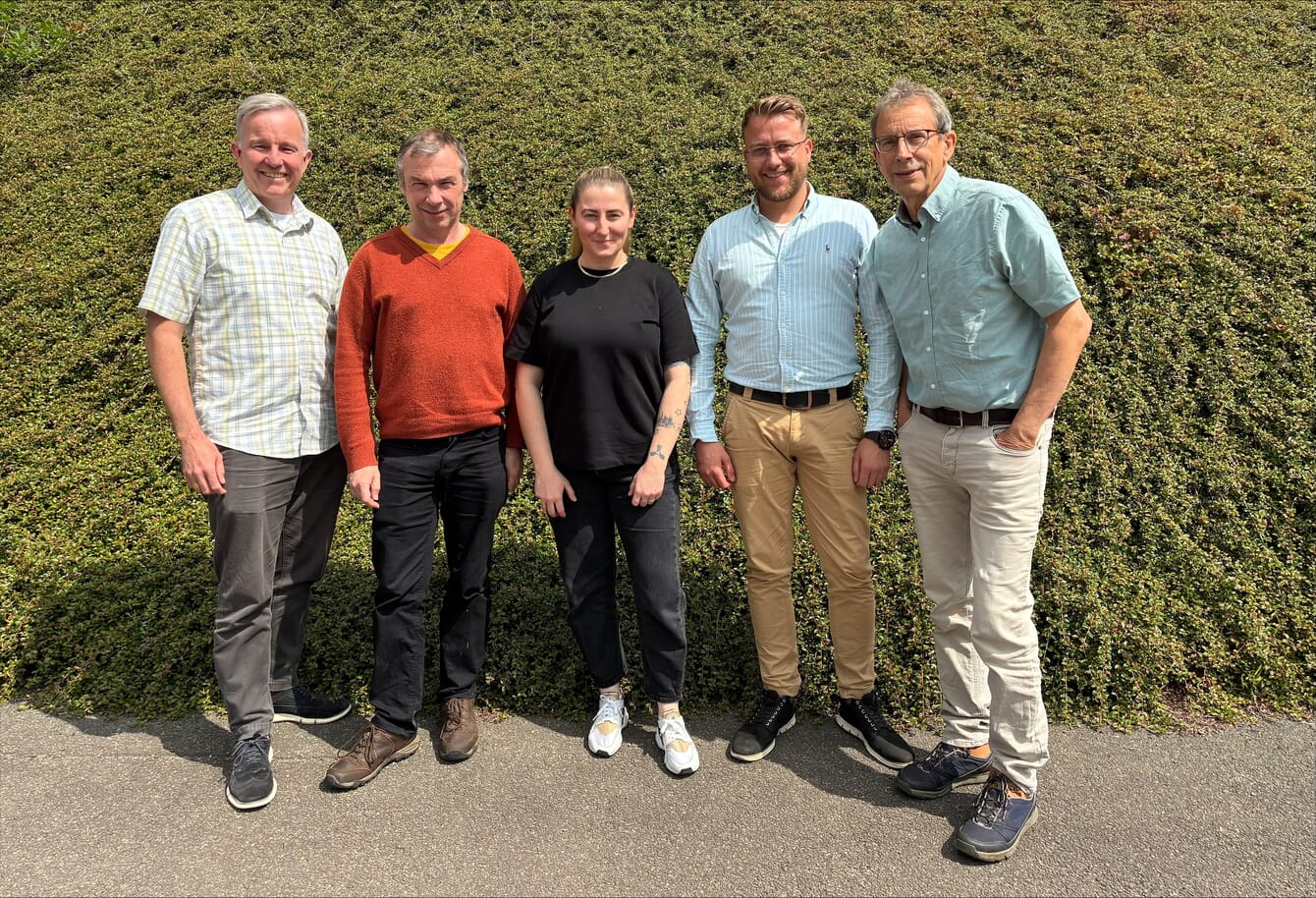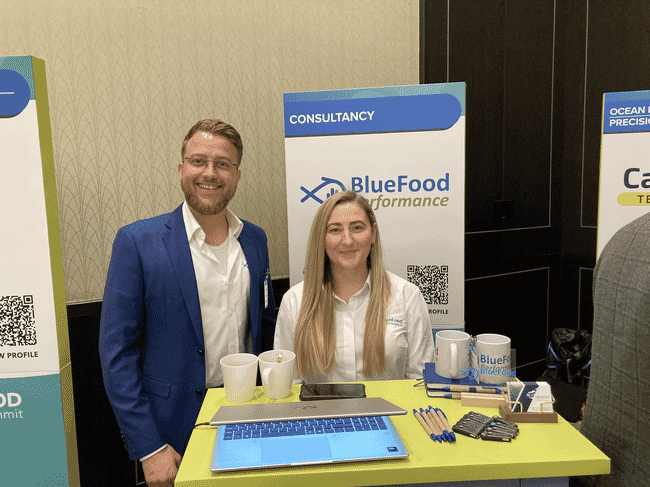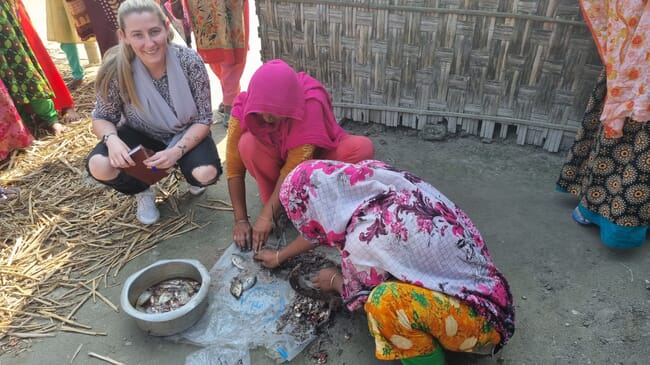
Left to right: Anton Immink, Dr Richard Newton, Dr Stephanie Horn, Wesley Malcorps and Prof Dave Little © Blue Food Performance
Can you tell me a bit about how and why Blue Food Performance (BFP) was formed?
It all started with a simple observation: that seafood companies were making bold sustainability claims, but many of these claims were impossible to verify.
The lack of harmonised standards and regulations mean that assessment methodologies vary widely, and interpretations are often inconsistent. To make matters more challenging, many of the sustainability criteria are self-assessed, without sufficient methodological detail or validation, thereby undermining credibility.
Most assessments narrowly focus on a small set of environmental indicators, overlooking other sustainability pillars and crucial seafood-related aspects like nutrient content or the interconnected nature of the entire value chain.
To address these challenges, we set out to develop a business plan centered on science-based, commercially relevant sustainability assessments. I was joined by Dr Stephanie Horn, who’s our lead analyst, manages daily operations and plays a leading role in advancing nutritional LCAs.
We work closely with Dr Richard Newton, an LCA specialist, who actively develops new metrics and growth strategies with the rest of the team. Anton Immink serves as improvement advisor, while Prof Dave Little acts as science advisor.
What services do you offer and can you tell us anything about your early clients?
We offer environmental, socio-economic, nutritional and fish welfare assessments for seafood companies at any point along the value chain. This includes validation of sustainability claims and enhancing performance, recommending effective decarbonisation strategies, benchmarking the impact of innovations throughout the seafood supply chain, and training and mentorship to ensure a smooth transition and long-term growth.
BFP served the latest cohort of startups in Hatch Blue’s Crest accelerator programme with sustainability assessments and interactive tools, and a new group of startups is set to receive support soon. Additionally, we are currently working with Manatee Holdings, a leading geoduck clam aquaculture facility in British Columbia.
How do you differ from the competition?
We are one of the very few companies with expertise in aquaculture and fisheries sustainability assessments. Uniquely, we are the only seafood sustainability consultancy formally supported by a university, enabling us to combine cutting-edge academic research with practical industry solutions.
What benefits do you bring to seafood businesses and how can they justify the additional cost?
A BFP sustainability assessment supports companies in meeting both internal and external sustainability objectives, such as achieving net zero commitments or attaining relevant certifications. Secondly, our assessments can help optimise production practices – leading to greater operational efficiency and potential cost savings. Finally, by demonstrating a proactive commitment to sustainability, companies can strengthen brand reputation and build trust with conscious consumers.
What have been your key milestones to date?
Securing contracts with a variety of clients, ranging from a geoduck ranching facility, companies and startups developing biotechnology, sensor technology, feed ingredient producers and a farm cluster. We expect to announce new clients soon.
While we offer tailored tool development, we have recently launched our first publicly accessible Fish In : Fish Out (FIFO) Performance Tool. This helps to measure and optimise the FIFO ratio, and is aligned with industry standards and LCA methodologies, empowering organisations to integrate the outputs into comprehensive sustainability assessments and reports.

© Blue Food Performance
What challenges do you still need to overcome?
There is a common misconception that our work is similar to that of certifiers or that we simply provide companies with green claims. In reality, we conduct in-depth assessments using a data-driven approach to generate quantitative insights into performance. Our focus is on enhancing efficiency within companies and across supply chains, providing actionable strategies rather than just validation.
Developing new metrics that are both scientifically rigorous and commercially relevant is crucial. However, this process is costly and time-consuming, requiring a careful balance between academic research and practical commercial applications. We really want to work closer with industry, making sure it meets expectations and challenges.
What response have you had from customers and from the wider seafood industry?
Industry and clients mentioned that they appreciate the comprehensive sustainability assessments, which can uncover inefficiencies within their company and across the value chain. The ability to conduct scenario intervention analysis empowers companies to better understand the impact of their decisions and future investments. These insights enable them to take a more strategic approach to sustainability, ensuring long-term resilience and competitive advantage.
We had several clients from technology companies who got really excited about tools we’ve developed that empower them to showcase interactively the impact of their technology/intervention on the farms and hatcheries they are working with.
In addition, we offer nutritional life cycle assessments (n-LCAs), an emerging and increasingly vital tool for companies operating within food value chains. With growing calls from both academia and industry for more robust and insightful n-LCAs, we are proud to be among the first consultancies equipped to deliver this service. Our clients have expressed enthusiasm about the potential of n-LCAs to enhance how they communicate their sustainability impact, particularly by linking environmental performance with nutritional value.
How have you funded the business and will you be looking for further investments?
We are self-funded and currently not looking for investors.
How would you like to see the business developing in the years ahead?
We aim to provide a variety of seafood companies – including fisheries, farms, feed producers, processors and technology companies – with tailored assessment, tools and training to boost sustainability performance, efficiencies and competitiveness. A crucial component is the development of new metrics that allow organisations to gain new insights into their performance, identifying hotspots and improving efficiencies.

© Blue Food Performance


